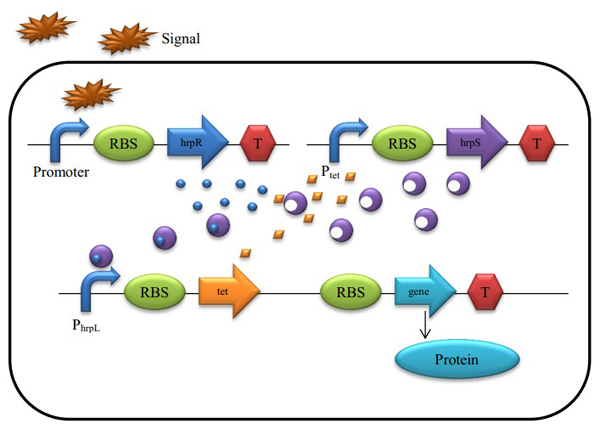Team:HIT-Harbin/Background
From 2013.igem.org
| Line 27: | Line 27: | ||
<div class="mainarea"> | <div class="mainarea"> | ||
<div class="multi-columns"> | <div class="multi-columns"> | ||
| + | <div class="preload alignright"> | ||
| + | <img src="https://static.igem.org/mediawiki/2013/c/c6/HIT-Harbin_Project_Schematic.png" alt="" /> | ||
| + | </div> | ||
<p>The composition of B-POM is that hrpR's promoter depends on the input, but hrpS’ promoter is always Ptet and tet owns PhrpL, while the output gene follows tet and shares PhrpL. Once the input is sensed, the input promoter triggers hrpR's transcription. The activity of Ptet is constitutive, which means HrpS protein is ample. As HrpR accumulates, HrpS binds to HrpR and form HrpRS which then triggers PhrpL, and tetR and output begin to accumulate. tetR can inhibit Ptet. As a feedback, HrpS and HrpRS will decrease. PhrpL will be of lower activity, so the amount of tetR and the level of output will decline. The decrease of tetR will enhance the hrpS' expression. All these construct a feedback cycle. Finally, the output will stabilize and be in a certain proportion with the input. By manipulating the RBS of hrpR, hrpS, tetR and output gene, we can control input-output proportion.</p> | <p>The composition of B-POM is that hrpR's promoter depends on the input, but hrpS’ promoter is always Ptet and tet owns PhrpL, while the output gene follows tet and shares PhrpL. Once the input is sensed, the input promoter triggers hrpR's transcription. The activity of Ptet is constitutive, which means HrpS protein is ample. As HrpR accumulates, HrpS binds to HrpR and form HrpRS which then triggers PhrpL, and tetR and output begin to accumulate. tetR can inhibit Ptet. As a feedback, HrpS and HrpRS will decrease. PhrpL will be of lower activity, so the amount of tetR and the level of output will decline. The decrease of tetR will enhance the hrpS' expression. All these construct a feedback cycle. Finally, the output will stabilize and be in a certain proportion with the input. By manipulating the RBS of hrpR, hrpS, tetR and output gene, we can control input-output proportion.</p> | ||
</div> | </div> | ||
Latest revision as of 02:05, 27 September 2013
Project/background

The composition of B-POM is that hrpR's promoter depends on the input, but hrpS’ promoter is always Ptet and tet owns PhrpL, while the output gene follows tet and shares PhrpL. Once the input is sensed, the input promoter triggers hrpR's transcription. The activity of Ptet is constitutive, which means HrpS protein is ample. As HrpR accumulates, HrpS binds to HrpR and form HrpRS which then triggers PhrpL, and tetR and output begin to accumulate. tetR can inhibit Ptet. As a feedback, HrpS and HrpRS will decrease. PhrpL will be of lower activity, so the amount of tetR and the level of output will decline. The decrease of tetR will enhance the hrpS' expression. All these construct a feedback cycle. Finally, the output will stabilize and be in a certain proportion with the input. By manipulating the RBS of hrpR, hrpS, tetR and output gene, we can control input-output proportion.
 "
"
